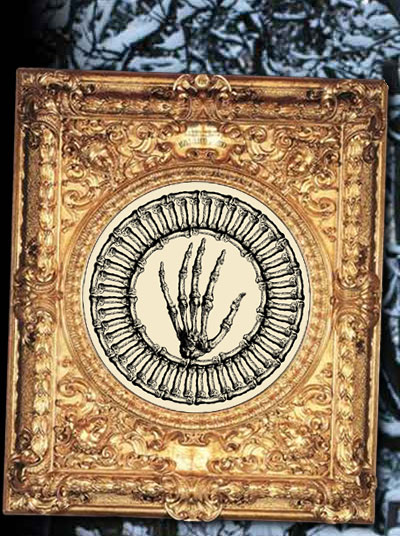Hela's Hand
by Gudrun of Mimirsbrunnr
She comes to me in the dark, always from behind. No matter where I am facing, I hear Her voice behind me, feel that bone hand clamp down on my shoulder. While She exerts little pressure, I always feel like sagging under the weight of it. Sometimes her hand burns, sometimes it is freezing cold. Sometimes I am not sure that I can tell the difference.
Unlike other Gods, She is quiet. Her aura is like a black hole, drawing you in, not a showy glow of divinity. She speaks plainly, with no verbal frills like her father Loki. Sometimes She says only a few words ... but they will be the exact words that are needed, whether or not you like them. Her voice echoes, somehow, even in close quarters.
Hela is found in silence, in dust, in the workings of insects, especially those who eat rotting flesh. She is found in carrion eaters and maggots - I watched a science-channel special on the "new" use of maggots to help clean the wounds of people with gangrene; apparently their bodily fluids are sterile and they eat only the bad flesh, then turn to flies and fly away. This is Hela, meticulously cleaning out the garbage; She does not need to be beautiful in order to do this. She is also found in necrotic bacteria, those tiny spirits that turn a dead corpse slowly into earth.
We think of life as clean and rotting as messy, ugly, chaotic, but the actual scientific truth is far different. Life is chaos, opening up and recombining in many different almost-random ways. The Gods of Life are profligate and wasteful, spawning a million so that a handful might survive, but the Gods of Death waste nothing at all. Rot is the neat, precise, predictable disassembly of the once-living into their component parts, so that life can continue its profligacy.
We turn away from rot, yet how many of us have rot within us? Rotting parts of heart and soul, things that fester in the dark of our personal basements. All these things belong to Her, and She reserves the right to open us up and claim them whenever She sees fit, even if we squall and cling to them. But She is nothing if not careful. She is precise, perfect; Her stroke is delicate as a scalpel - and hurts as much.
Hela's Rune is Ear, the Grave. Yet its figure is no great hole like a grave; instead it is the singletree, the scaffold upon which a carcass is butchered. That is the way She does her job - we are stretched upon the scaffold for her to work on. We are dead carcasses, being slaughtered; our flesh will feed and bring life to others. These days, the Dead are filled with chemicals and sealed in tiny boxes, not allowed to rot. Hela will not stand for this. To prevent a body from its destiny of becoming one with the elements is blasphemy, and evil. It is said that a soul cannot move on in peace to another life until its body is rotted; these days, souls move on while their last flesh still grimaces horribly in its pristine package, and what kind of trouble does this wreak on our souls? Go to the flames, go to the ocean, Hela says - go anywhere but there, although becoming one with the wonderful Earth is best.
I have seen Her holding the ghosts of dead babes in Her arms, rocking them and singing to them. She has no children of Her own that we know of, but all the Dead are Her children. If she wants to hold them, She has blue-faced babes aplently, pale children to comfort, and elders to tend lovingly. She feeds the Dead, and whatever the jealous stories may say, no one goes hungry at Hela's table. It is named Hunger because that is what the Dead come to slake; every morsel they eat brings them further from their living life and pulls them towards the Void, where She will decide whether they will go on or stay.
There is a well in an inner courtyard of Elvidnir; I have seen it, though I dare not touch the waters within. They are blacker than night, and when I saw it I knew that this was Ginnungagap, Nun, the primal Void. Of all the Gods, only Hela and Surt do not fear Ginnungagap, and only Hela can reach into it, across it, through it with a human soul in her hand, and find for it a home. It was She who placed me into this body, and it is Her that I will serve while I live in this flesh.

